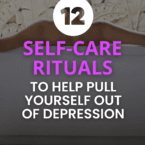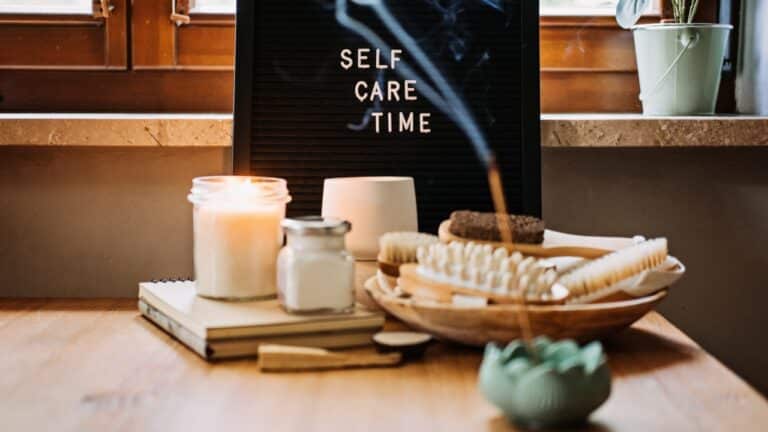
When you’re caught in the clutches of depression, it’s easy to feel like you’re sinking into a dark abyss with no way out. But no matter how difficult things may seem, remember this: you are not alone, and there are steps you can take to help you navigate this challenging journey. One such measure is implementing self-care rituals into your daily routine.
Self-care is all about taking care of your physical, emotional, and mental wellbeing. It’s about identifying your own needs and taking steps to meet them. When dealing with depression, self-care can often fall by the wayside, but it’s vital in helping to manage symptoms and enhance overall wellbeing.
Here are 12 self-care rituals you can integrate into your life to help pull yourself out of depression:
1. Establish a Morning Ritual
Having a morning routine can provide structure and a sense of normalcy. This could be as simple as having a cup of tea, reading, stretching, or spending a few minutes in silence to mentally prepare for the day.
2. Engage in Regular Physical Activity
Physical activity releases endorphins, natural mood-boosters that can help to alleviate symptoms of depression. Try incorporating a form of exercise that you enjoy into your routine, such as walking, yoga, or swimming.
3. Prioritize Sleep
Depression and sleep problems often go hand in hand. Prioritizing good sleep hygiene — including keeping a consistent sleep schedule and creating a peaceful sleep environment — can significantly improve mood and energy levels.
4. Nourish Your Body
Proper nutrition is an essential part of self-care. Try to eat a balanced diet rich in fruits, vegetables, lean proteins, and whole grains to nourish your body and maintain energy levels.
5. Practice Mindfulness and Meditation
Mindfulness and meditation can help to reduce stress and improve mood. Even a few minutes a day can make a difference. There are numerous apps and online resources available to help you get started.
Related: 10 DIY Cognitive-Behavioral Techniques to Undepress Yourself >>
6. Stay Hydrated
It sounds simple, but drinking enough water is an essential aspect of self-care. Dehydration can lead to physical discomfort and can affect mood and cognition.

7. Spend Time in Nature
Spending time outdoors can have significant benefits for mental health. Try to spend a little time each day in nature, whether it’s a walk in the park or sitting in your backyard.
8. Connect with Others
Isolation can exacerbate feelings of depression. Reach out to trusted friends or family, join a support group, or connect with others in online communities. Remember, you’re not alone.
9. Practice Gratitude
Although it may be challenging when you’re depressed, focusing on what you’re grateful for can help to shift your mindset and promote a more positive outlook.
10. Limit Screen Time
While technology can be a useful tool, too much screen time can contribute to feelings of depression. Try to set boundaries for your technology use, especially before bedtime.
11. Do Something You Enjoy Every Day
Whether it’s reading a book, painting, or listening to your favorite podcast, make time each day for activities that bring you joy.
12. Practice Self-Compassion
Depression can lead to negative self-talk. Be kind to yourself. You’re doing the best you can, and it’s okay to have bad days. Remember, self-care isn’t a luxury, it’s a necessity.
Read Next: 10 Creative Outlets to Help You Pull Out of Depression >>
Final Thoughts
Implementing these self-care rituals is an empowering step toward managing your depression. By consciously taking time each day to care for your physical, mental, and emotional health, you’re reaffirming your worth and taking control of your well-being.
Each ritual serves a unique purpose. From nourishing your body with healthy foods and staying hydrated, to getting regular physical activity and ensuring adequate sleep, these actions have a profound impact on your mood and energy levels. Mindfulness techniques and spending time in nature offer a reprieve from negative thoughts, while connecting with others can provide a support system and reminder that you’re not alone in your struggle.
Limiting screen time and incorporating activities you enjoy fosters a positive environment and mindset. Lastly, practicing self-compassion is perhaps the most crucial aspect of self-care. Remind yourself that it’s okay to have bad days and that recovery isn’t a linear process. Be gentle and forgiving with yourself as you navigate this challenging journey.
Remember, the key is to find what works best for you. Your self-care routine should resonate with your needs and preferences, making you feel good about your path to recovery. While these strategies can help manage symptoms, it’s vital to reach out to a healthcare professional if your symptoms persist or worsen. Depression is a serious illness, and you don’t have to face it alone.
You’re stronger than your depression, and with the right self-care tools and support, recovery is more than just a possibility — it’s a very real outcome. Stay strong, keep going, and always remember to take care of yourself, because you are worth it.















